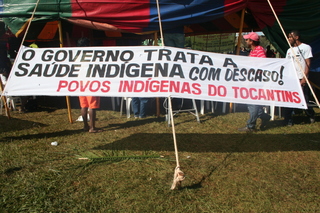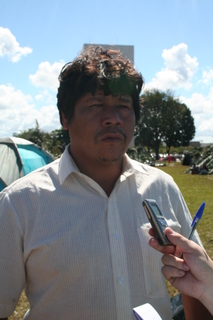Indigenous Free Land Camp occupies Esplanada dos Ministerios, Brasília
 Major national political manifestation of the Brazilian indigenous movement, Free Land Camp ends on Thursday, with a whole list of demands to the federal government and demonstration.
Major national political manifestation of the Brazilian indigenous movement, Free Land Camp ends on Thursday, with a whole list of demands to the federal government and demonstration.
By Renato Santana
Over 600 indigenous peoples from around the country occupy the Esplanada dos Ministérios, the main governmental avenue in Brasília with the Free Land Camp 2011. It is the eighth edition of this annual manifestation, organized by the Articulation of Indigenous Peoples of Brazil (Apib) with support of the Indigenist Missionary Council, Cimi.
The indigenous moved into town in the early hours of Monday, May 2, setting up camp in front of the House of Congress and the Ministry of Mining and Energy. They will remain until next Thursday. Members of at least 70 different indigenous peoples are present. The main banner of the movement: respect for the indigenous rights, as guaranteed by Brazil´s Federal Constitution and International Treaties.
Another world is possible
The executive secretary of the Indigenous Missionary Council (CIMI), Eden Magelhães, explained Cimi´s support for the Free Land Camp considering it a uniting moment for the indigenous movement which is concerned with the various forms of aggression it faces against the territories of communities.
"We believe that another world is possible with the Indians," he said. For him, large enterprises, such as the enormous Belo Monte hydroelectric, in the Amazon state of Para, as well as the lack of demarcation of indigenous lands and the growing criminalization of the indigenous leaders are ways to take away the traditional and constitutional rights of the indigenous peoples.
large enterprises, such as the enormous Belo Monte hydroelectric, in the Amazon state of Para, as well as the lack of demarcation of indigenous lands and the growing criminalization of the indigenous leaders are ways to take away the traditional and constitutional rights of the indigenous peoples.
The surrounding society increasingly views the construction of dams and the expansion of agribusiness as signs of national development. However, the Indians do not see it that way. "The construction of a hydroelectric plant floods everything around it. How can we live without our forests? A whole cycle of indigenous culture is there. From our ancestors to animals and natural remedies," said Kretã Kaingang, of the Kainging people of the South of Brazil.
Life under tarp barracks
The attacks and threats on the indigenous peoples impact their communities in similar ways all over Brazil. Some situations, however, specifically reveal the size of the indifference of government officials, most of all of the Funai, the Federal organ for Indigenous Affairs. Many communities of the Guarani of the Southern state of Rio Grande do Sul survive along the highways in shacks and tarp barracks because their land has not been demarcated and ratified. In these conditions, about three thousand Guarani are scattered throughout the state. This situation is also experienced by thousands Guarani of South-Western state of Mato Grosso do Sul.
 Maurice Guarani is one of the leaders of his people. He explains that some lands have been demarcated, "but they are very small and our population has increased (…) in these lands my people can also not grow enough food." The life under tarp of the Guarani in his state is along the highways BR-101, BR-116 BR-290 and BR-040. The people survive without potable water, medical assistance, basic sanitation and food is scarce.
Maurice Guarani is one of the leaders of his people. He explains that some lands have been demarcated, "but they are very small and our population has increased (…) in these lands my people can also not grow enough food." The life under tarp of the Guarani in his state is along the highways BR-101, BR-116 BR-290 and BR-040. The people survive without potable water, medical assistance, basic sanitation and food is scarce.
"The Free Land Camp is an important moment to show all this to president Dilma (Roussef) and demand that our rights are respected. It is the cry of the Guarani and of all indigenous people in the country," said Maurice.
Belo Monte, Beautiful Death
In the Amazon state of Pará, the challenge of the indigenous is fighting the construction of the Belo Monte hydroelectric. Josinei Arara, of the Arara people, lives with his community in the famous Big Bend of the Xingu River. The project will finish off the village where he lives, as well as 29 others in the region. For him, the hydroelectric will destroy the forest and that will affect even communities that will not go under water.
"We do not want anything that would destroy our Amazon, our forest. Of her we draw our culture. We must preserve it for our children and grandchildren. We will fight until the end," he stressed. Belo Monte is another item on the list of demands of the Free Land Camp. The plant became a symbol, next to the arrests and killings of indigenous leaders, of how much the federal government tramples on the indigenous rights guaranteed by law. Federal agency Funai has even come to forge a query to people to build the plant.
Josinei Arara reported that he suffered threats: "They say they will burn our village." All the pressure suffered by the Indians, including by the Federal Police and in the Serra do Padeiro, in the South of Bahia, where the Tupinambá people live, increases ever more. In the plenary session of the Camp statements of various leaders corroborate the news stories of murder, arrest warrants and death threats.
Intimidation
Neguinho Truká lives with his people in Pernambuco. The São Francisco River Transposition is the enterprise that jeopardizes the villages of the Truká peoples. "Since 2005 we have been fighting for the demarcation of our land. With the transposition it is estimated that 385.000 hectares of land will be deforested," he says, adding that a Brazilian Army base is installed on the land Truká to intimidate his people.
The resistance continues to be the only way out for the indigenous peoples against the attacks on their rights. "We are the real federal peoples. But if the feds [federal police] want to come get us out of our land, we have our bordunas (wooden clubs) to receive them," says Isabel Apinajé, of the sate of Tocantins.
Follow the event live on the Internet: http://www.ustream.tv/channel/atlindigena.

